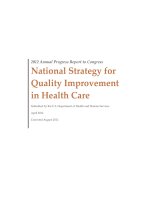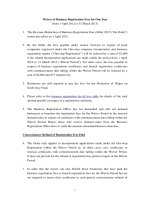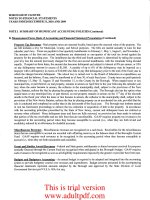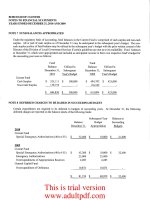Annual ne report 1 april 2017 to 31 march 2018 final v5
Bạn đang xem bản rút gọn của tài liệu. Xem và tải ngay bản đầy đủ của tài liệu tại đây (838.09 KB, 61 trang )
Never Events reported as
occurring between 1 April 2017
and 31 March 2018 – final
update
Published April 2019
NHS England and NHS Improvement
Contents
Important note on how this data is published ........................................................ 2
Never Events….………………………………………………………………………….2
Supporting healthcare providers to prevent Never Events .................................... 3
Investigating and learning from Never Events ....................................................... 5
Data set 1 - Never Events reported as occurring between 1 April 2017 and 31
January 2018......................................................................................................... 6
Data set 2 - Never Events reported as occurring between 1 February and 31
March 2018 ......................................................................................................... 47
1 | Contents
Never Events reported as occurring between 1 April 2017
and 31 March 2018 – final update
Now that sufficient time has elapsed to allow for local incident investigation and
national analysis of data following the end of the 2017/18 reporting year, this report
provides a final update of Never Events reported as occurring between 1 April 2017
and 31 March 2018. It replaces and supersedes the previously published
provisional data reports for 2017/18.
Important note on how this data is published
From 1 February 2018, providers were asked to report Never Events against a
revised Never Events policy and framework and list of incidents designated as
Never Events. This revised list includes additional incident types now designated as
Never Events, the removal of a previously designated Never Event, and definitional
changes to some types of Never Events.
As a result, Never Events reported after 1 February 2018 are not comparable with
those reported earlier in the 2017/18 financial year as the definitions and
designated list of Never Events had changed.
This report has therefore been published as two separate data sets. Data set 1
covers the period 1 April 2017 to 31 January 2018 (see page 6); Data set 2 covers
the period 1 February to 31 March 2018 (see page 46).
Never Events
Never Events are serious, largely preventable patient safety incidents that should
not occur if healthcare providers have implemented existing national guidance or
safety recommendations. The Never Events policy and framework – revised
January 2018 suggests that Never Events may highlight potential weaknesses in
how an organisation manages fundamental safety processes. Never Events are
different from other Serious Incidents as the overriding principle of having the Never
Events list is that even a single Never Event acts as a red flag that an
organisation’s systems for implementing existing safety advice/alerts may not be
robust.
2 | Never Events reported as occurring between 1 April 2017 and 31 March 2018
The concept of Never Events is not about apportioning blame to organisations
when these incidents occur but rather to learn from what happened. This is why,
following consultation, in the revised Never events policy and framework we
removed the option for commissioners to impose financial sanctions when Never
Events were reported. The foreword to the framework states: “……allowing
commissioners to impose financial sanctions following Never Events reinforced the
perception of a ‘blame culture’. Our removal of financial sanctions should not be
interpreted as a weakening of effort to prevent Never Events. It is about
emphasising the importance of learning from their occurrence, not blaming.”
Identifying and addressing the reasons behind this can potentially improve safety in
ways that extend far beyond the department where the Never Event occurred or the
type of procedure involved.
Please note that because the definitions and designated list of Never Events were
revised from February 2018, this update has been split into two data sets which
cover before and after the revision and direct comparison of the number of Never
Events with earlier periods is not appropriate.
The revised 2018 Never Events policy and framework requires commissioners and
providers to agree and report Never Events via the Strategic Executive Information
System (StEIS). Where a Serious Incident is logged as a Never Event but does not
appear to fit any definition on the revised Never Events list, commissioners are
asked to discuss this with the provider organisation and either add extra detail to
StEIS to confirm it is a Never Event or remove its Never Event designation from the
StEIS system.
Supporting healthcare providers to prevent Never
Events
To help prevent Never Events a set of new national safety standards for invasive
procedures (NatSSIPs) was published in September 2015, and all relevant NHS
organisations in England have now been instructed to develop and implement their
own local standards based on the national principles of the NatSSIPs.
These new standards set out broad principles of safe practice and advise
healthcare professionals on how they can implement best practice: for example,
through a series of standardised safety checks and education and training. The
standards also support NHS providers to work with staff to develop and maintain
3 | Never Events reported as occurring between 1 April 2017 and 31 March 2018
their own, more detailed, local standards and encourage organisations to share
best practice.
To help prevent nasogastric Never Events, an Alert Nasogastric tube
misplacement: continuing risk of death and severe harm and resource set were
published by NHS Improvement in July 2016. These provide materials to help trust
boards, or their equivalents, assess whether previous alerts and guidance about
nasogastric tubes have been implemented and embedded in their organisations.
The Care Quality Commission has undertaken a recent thematic review in
collaboration with NHS Improvement to get a better understanding of what can be
done to prevent the occurrence of Never Events. The report ‘Opening the door to
change’ was published in December 2018.
The report found that: “Never Events continue to happen despite the hard work and
efforts of frontline staff. Staff are struggling to cope with large volumes of safety
guidance, they have little time and space to implement guidance effectively, and the
systems and processes around them are not always supportive. Where staff are
trying to implement guidance, they are often doing this on top of a demanding and
busy role that makes it difficult to give the work the time it requires.”
The report includes a recommendation that “NHS Improvement should review the
Never Events framework and work with professional regulators and royal colleges
to take account of the difference in the strength of different kinds of barrier to errors
(such as distinguishing between those that should be prevented by human
interactions and behaviours such as using checklists, counts and sign-in processes;
and those that could be designed out entirely such as through the removal of
equipment or fitting/using physical barriers to risks). This review should focus on the
leadership and culture needed to underpin safety. It should take into account the
different settings in which Never Events occur, including acute, mental health and
community settings”
Work to implement those recommendations may involve changes to the approach
of the Never Events framework and the list of Never Events in the future.
4 | Never Events reported as occurring between 1 April 2017 and 31 March 2018
Investigating and learning from Never Events
NHS providers are encouraged to learn from mistakes and any organisation that
reports a Never Event is expected to conduct its own investigation so it can learn
and take action on the underlying causes.
The fact that more and more NHS staff take the time to report incidents is good
evidence that this learning is happening locally. We continue to encourage NHS
staff to report Never Events and Serious Incidents to StEIS and all patient safety
incidents to the National Reporting and Learning System (NRLS), to help us identify
any risks so that necessary action can be taken.
Data on Never Events for 2016/17 and previous years can be found on the NHS
Improvement website.
5 | Never Events reported as occurring between 1 April 2017 and 31 March 2018
Data set 1
Never Events reported as occurring between 1 April
2017 and 31 January 2018
Please note: for the reasons mentioned at the beginning of this report, data
set 1 is not comparable with data set 2 covering the period 1 February to 31
March 2018.
Summary
This set of data is drawn from the StEIS system, and includes all Serious Incidents
with a reported incident date between 1 April 2017 and 31 January 2018 and which
on 26 September 2018 were designated by their reporters as Never Events.
When data for this report was extracted, 418 Serious Incidents on the StEIS system
were designated by their reporters as Never Events and had a reported incident
date between 1 April 2017 and 31 January 2018. Of these 418:
•
407 Serious Incidents appeared to meet the definition of a Never Event in
the Never Events list 2015/16 and had an incident date between 1 April
2017 and 31 January 2018
•
A further 10 Serious Incidents did not appear to meet the definition of a
Never Event and the relevant organisations have been asked to review
them accordingly
•
One was a duplicate entry.
More detail is provided in the tables below.
6 | Never Events reported as occurring between 1 April 2017 and 31 March 2018
Table 1: Never Events 1 April 2017 to 31 January 2018 by month of incident*
Month in which Never Event occurred
Number
April 2017
40
May 2017
39
June 2017
41
July 2017
49
August 2017
39
September 2017
28
October 2017
60
November 2017
46
December 2017
29
January 2018
36
Total
407
Note: A further 10 Serious Incidents did not appear to meet the definition of a Never
Event and the relevant organisations have been asked to review them accordingly. One
was a duplicate entry.
Table 2: Never Events 1 April 2017 to 31 January 2018 by type of incident with
additional detail*
Type and brief description of Never Event
Number
Wrong site surgery
175
Angiogram intended for another patient
1
Ascites drained rather than seroma
1
Carpal tunnel release instead of trigger finger release
1
Central line intended for another patient
1
Cervical biopsy taken rather than colon biopsy
1
Cheek biopsy on wrong patient
1
7 | Never Events reported as occurring between 1 April 2017 and 31 March 2018
Colonoscopy instead of cystoscopy
1
Colposcopy intended for another patient
1
Contraceptive implant to wrong arm
1
Contrast injection to wrong groin
1
Cystoscopy performed that was not consented for
1
Cystoscopy intended for another patient
2
Exploration of wrong part of ear to remove foreign body
1
Excision of skin lesion that was intended for another patient
1
Filshie clip applied to round ligament rather than fallopian tube
1
Fusion of the wrong finger joint
1
Gastroscopy intended for another patient
1
Gastroscopy performed in addition to the planned procedure
1
Grommets inserted that were intended for another patient
1
Haemorrhoidectomy instead of incision and drainage of pilonidal
sinus
1
Hip injection intended for another patient
1
Incision to wrong area of arm
1
Incision to wrong finger
1
Incision to wrong leg
1
Incision to wrong toe
1
Injection to wrong eye
2
Injection to wrong leg
1
Injection to wrong vocal chord
1
K wire to wrong finger
1
Laser surgery to wrong eye
1
Lumbar puncture intended for another patient
1
8 | Never Events reported as occurring between 1 April 2017 and 31 March 2018
Oesophago gastro duodenoscopy instead of flexible sigmoidoscopy
1
Ovaries removed in error when the plan was to conserve them
4
Ovary and fallopian tube not removed when plan was to remove them
1
Perianal abscess incised instead of pilonidal abscess
1
PICC line intended for another patient
1
Removal of wrong side ureteric stent
1
Sigmoidoscopy intended for another patient
1
Ultrasound guided biopsy intended for another patient
1
Urodynamics examination intended for another patient
1
Wrong abscess excised
1
Wrong area of breast biopsied
1
Wrong area of breast excised
1
Wrong breast lesion removed
2
Wrong eye injection
4
Wrong finger
1
Wrong finger incision
1
Wrong hand tendon transfer
1
Wrong hernia repair
1
Wrong hip bursa excised
1
Wrong hip incision
1
Wrong incision - elbow instead of finger
1
Wrong kidney biopsy
1
Wrong level spinal surgery
12
Wrong lung biopsy
1
Wrong rib biopsy
1
9 | Never Events reported as occurring between 1 April 2017 and 31 March 2018
Wrong rib removed
1
Wrong shoulder injection
1
Wrong side angioplasty
2
Wrong side angioplasty incision
1
Wrong side breast biopsy
1
Wrong side chest drain
3
Wrong side hernia repair
1
Wrong side jaw incision
1
Wrong side lithotripsy
1
Wrong side nephrostomy
1
Wrong side of elbow
1
Wrong side radio frequency ablation
1
Wrong side spinal injection
5
Wrong side spinal surgery
1
Wrong side stent removed
1
Wrong side ureteric stent
5
Wrong side ureteroscopy
1
Wrong site block
Wrong skin lesion biopsy
Wrong skin lesion removed
Wrong thumb injection
Wrong tooth/teeth removed
Wrong type of squint surgery - convergent rather than divergent
Retained foreign object post procedure
Cap from joint washout tubing
10 | Never Events reported as occurring between 1 April 2017 and 31 March 2018
26
3
12
1
28
1
102
1
Cardiac valve armature
1
Catheter end piece that prevented removal
1
Dental pack
1
Digital tourniquet
1
Femoral lag screw
1
Guide wire - central line
13
Guide wire - chest drain
3
Guide wire - PICC line
1
Guide wire - temporary cardiac pacing wire
1
Guide wire - urodynamics sensor
1
Guide wire – vascath
2
K wire
2
Ophthalmic trocar
1
Part of a drill bit
1
Part of a screw
1
Part of a specimen retrieval bag
1
Part of a tracheostomy swab
1
Part of surgical needle
1
Part of umbilical venous catheter
1
Piece of amplatz wire
1
Piece of laparoscopic port tubing
1
Piece of plastic tubing
1
Plastic from pulse lavage system
1
Plastic sheath from ablation procedure
1
Raney arterial clamp
1
11 | Never Events reported as occurring between 1 April 2017 and 31 March 2018
Ribbon gauze
1
Screw 'ears' from spinal fusion procedure
1
Screw from cabling system during hip replacement
1
Screw from knee replacement instrumentation
1
Sheath from ureteric balloon dilator
1
Small piece of metal following laparoscopic procedure
1
Specimen retrieval bag
3
Surgical clamp
2
Surgical drain
1
Surgical glove
1
Surgical needle
2
Surgical swab
Throat pack
Vaginal swab
15
5
22
Valve opener from cardiac procedure
1
Vascular clamp
1
Vascular sling
1
Wrong implant/prosthesis
63
Cranial plate that was custom made for another patient
1
Femoral nail instead of tibial nail
1
Hip
13
Knee
13
Lens
25
Wrong intrauterine device
4
Wrong stent
6
12 | Never Events reported as occurring between 1 April 2017 and 31 March 2018
Misplaced naso- or orogastric tubes
Naso gastric tube in respiratory tract and feed administered
22
22
Wrong route administration of medication
21
Epidural medication given intravenously
9
Intravenous medication given intrathecally
1
Oral medication given intravenously
8
Oral medication given subcutaneously
3
Overdose of methotrexate for non-cancer treatment
6
Overdose of methotrexate for non-cancer treatment
6
Overdose of insulin due to abbreviations or incorrect device
Wrong syringe used
Transfusion or transplantation of ABO incompatible blood
components or organs
Wrong blood transfused
Falls from poorly restricted windows
5
5
4
4
3
Window restrictors not fitted
2
Window restrictor removed
1
Chest or neck entrapment in bedrails
2
Chest or neck entrapment in bedrails
2
Scalding of patients
2
Small area of redness to buttock as bath water temperature not
checked
1
Water temperature increased during use
1
Failure to install functional collapsible shower or curtain rails
Curtain rail failed to collapse
Mis-selection of a strong potassium containing solution
13 | Never Events reported as occurring between 1 April 2017 and 31 March 2018
1
1
1
Potassium administered instead of fentanyl
Total
Note: A further 10 Serious Incidents did not appear to meet the definition of a Never
Event and the relevant organisations have been asked to review them accordingly.
One was a duplicate entry.
14 | Never Events reported as occurring between 1 April 2017 and 31 March 2018
1
407
Abbeyfield Medical
Centre, reported by NHS
North East Essex CCG
1
Aintree University
Hospital NHS Foundation
Trust
4
Airedale NHS Foundation
Trust
Alder Hey Children's NHS
Foundation Trust
Barking, Havering and
Redbridge University
Hospitals NHS Trust
Barnsley Hospital NHS
Foundation Trust
1
2
1
3
2
15 | Never Events reported as occurring between 1 April 2017 and 31 March 2018
Total
Mis-selection of a
strong potassium
containing solution
Failure to install
functional collapsible
shower or curtain rails
Scalding of patients
Chest or neck
entrapment in bedrails
Falls from poorly
restricted windows
Transfusion or
transplantation of ABO
incompatible blood
components or organs
Overdose of insulin
due to abbreviations
or incorrect device
Overdose of
methotrexate for non
cancer treatment
Wrong route
administration of
medication
Misplaced naso- or
orogastric tubes
Wrong
implant/prosthesis
Retained foreign
object post procedure
Wrong site surgery
Table 3: Never Events 1 April 2017 to 31 January 2018 by healthcare provider*
1
5
2
1
3
2
Retained foreign
object post procedure
Wrong
implant/prosthesis
2
3
1
Basildon and Thurrock
University Hospitals NHS
Foundation Trust
2
Bedford Hospital NHS
Trust
Birmingham Community
Healthcare NHS
Foundation Trust
Birmingham Women's
and Children's Hospital
NHS Foundation Trust
Blackpool Teaching
Hospitals NHS
Foundation Trust
1
3
2
16 | Never Events reported as occurring between 1 April 2017 and 31 March 2018
Total
Mis-selection of a
strong potassium
containing solution
Failure to install
functional collapsible
shower or curtain rails
Scalding of patients
Chest or neck
entrapment in bedrails
Falls from poorly
restricted windows
Transfusion or
transplantation of ABO
incompatible blood
components or organs
Overdose of insulin
due to abbreviations
or incorrect device
Overdose of
methotrexate for non
cancer treatment
Wrong route
administration of
medication
Misplaced naso- or
orogastric tubes
Wrong site surgery
Barts Health NHS Trust
6
2
3
2
2
2
1
2
BMI Bath Private
Hospital, reported by
NHS Bath and North East
Somerset CCG
BMI Edgbaston private
hospital, reported by
Birmingham Cross City
CCG
1
BMI Bedford Private
Hospital, reported by
NHS Bedfordshire CCG
1
BMI Chelsfield Park
Private Hospital, reported
by NHS Bromley CCG
1
BMI Chiltern private
hospital, reported by NHS
Aylesbury Vale CCG
1
1
17 | Never Events reported as occurring between 1 April 2017 and 31 March 2018
1
1
1
1
1
Total
Mis-selection of a
strong potassium
containing solution
Failure to install
functional collapsible
shower or curtain rails
Scalding of patients
Chest or neck
entrapment in bedrails
Falls from poorly
restricted windows
Transfusion or
transplantation of ABO
incompatible blood
components or organs
Overdose of insulin
due to abbreviations
or incorrect device
Overdose of
methotrexate for non
cancer treatment
Wrong route
administration of
medication
Misplaced naso- or
orogastric tubes
Wrong
implant/prosthesis
Retained foreign
object post procedure
Wrong site surgery
BMI The Hampshire
private clinic, reported by
NHS North Hampshire
CCG
1
Bolton NHS Foundation
Trust
1
BPAS Doncaster, reported
by NHS Nene CCG
1
1
BMI Woodlands private
hospital, reported by NHS
Nene CCG
1
1
18 | Never Events reported as occurring between 1 April 2017 and 31 March 2018
1
2
1
BPAS Liverpool, reported
by NHS Halton CCG
1
1
Bradford Teaching
Hospitals NHS
Foundation Trust
1
1
Total
Mis-selection of a
strong potassium
containing solution
Failure to install
functional collapsible
shower or curtain rails
Scalding of patients
Chest or neck
entrapment in bedrails
Falls from poorly
restricted windows
Transfusion or
transplantation of ABO
incompatible blood
components or organs
Overdose of insulin
due to abbreviations
or incorrect device
Overdose of
methotrexate for non
cancer treatment
Wrong route
administration of
medication
Misplaced naso- or
orogastric tubes
Wrong
implant/prosthesis
Retained foreign
object post procedure
Wrong site surgery
Brighton and Sussex
University Hospitals NHS
Trust
2
Buckinghamshire
Healthcare NHS Trust
1
2
1
Burton Hospitals NHS
Foundation Trust
Calderdale and
Huddersfield NHS
Foundation Trust
1
1
Cambridgeshire
Community Services
NHS Trust
1
1
Cambridge University
Hospitals NHS
Foundation Trust
2
1
2
4
2
2
1
19 | Never Events reported as occurring between 1 April 2017 and 31 March 2018
4
Total
Mis-selection of a
strong potassium
containing solution
Failure to install
functional collapsible
shower or curtain rails
Scalding of patients
Chest or neck
entrapment in bedrails
Falls from poorly
restricted windows
Transfusion or
transplantation of ABO
incompatible blood
components or organs
Overdose of insulin
due to abbreviations
or incorrect device
Overdose of
methotrexate for non
cancer treatment
Wrong route
administration of
medication
Misplaced naso- or
orogastric tubes
Wrong
implant/prosthesis
Retained foreign
object post procedure
Wrong site surgery









